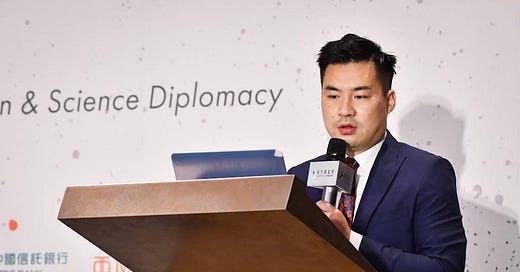First and foremost is for us to avoid the 2027 scenario. Many people are saying that the PLA will have the capability and willingness to invade Taiwan in 2027. So for the next five years we will have to avoid that happening.
Everyone is talking about Taiwan, but unless you are Nancy Pelosi you don’t often get to engage directly with its leadership. So when a friend offered to introduce me to the head of the Kuomintang (KMT) office in the US, I welcomed the opportunity to talk to Taiwan’s opposition party’s representative in Washington, Eric Huang. A graduate of the University of Virginia, he knows the neighborhood.
We had no shortage of topics to discuss. Taiwan is front and center in both global economics and geopolitics. Home to just 23 million people, it is the beating heart of everything that makes our modern world tick—semiconductors. Highly integrated with China, it recently got caught in the crosshairs of US regulatory actions targeting China’s technology sector, the China Chips Act. Shares of its largest company, TSCM plunged on the news (although they rebounded Friday on reports of record profits).
Even Elon Musk has waded into the debate over Taiwan. In an recent interview in the Financial Times he said that his recommendation “would be to figure out a special administrative zone for Taiwan that is reasonably palatable, probably won’t make everyone happy. And it’s possible, and I think probably, in fact, that they could have an arrangement that’s more lenient than Hong Kong.” Doubtless he has not read China’s white paper on Taiwan’s path forward. His message was not warmly welcomed in Taipei.
Musk is not alone searching in this crisis-weary world for a way out of a possible conflict that some call inevitable, and a new world war in the Pacific. In a must-read article in Foreign Affairs How to Avoid a War Over Taiwan some of our most highly-respected Taiwan scholars list alternatives and write that the US cannot help defend Taiwan if the island will not defend itself. Perhaps it is impossible to maintain a sense of urgency indefinitely but they feel that Taiwan could do more in term of strategic preparedness against a blockade as well as an invasion.
Huang and I spoke about one aspect of this readiness, conscription. The “most dangerous place on earth” only requires four months of military service and there is strong opposition to anything longer. Another young member of the KMT is Hsu Chiao-hsin an up-and-coming female star who advocates mandatory military service for women as well as men. Should the Allies be called on to defend Taiwan in a hot war, this issue will surely come up. Taiwan and the KMT has come a long way from its 38 years of martial law, the longest such period anywhere in the world.
We discussed The Taiwan Policy Act of 2022 , an update to the 1979 Taiwan Relations Act which was passed by the Senate after our interview. It is part of a definitive move away from strategic ambiguity and includes $6.5B in military support by the US.
Another issue we talked about was Taiwan’s birthrate, which is the lowest in the world. By 2070 its working age population will halve and by 2025 it will be a “super-aged” society with 20% of its population over the the age of 65. 34th in the world in terms of life expectancy, Taiwan’s Covid policies were highly successful at maintaining public health. This could help the current party in power, the Democratic Progressive Party (DPP) headed by President Tsai Ing-wen. Mid-term elections slated for November 26th could however be an opportunity for the KMT to regain ground, especially in its 22 municipalities including Taipei itself.
For historical reasons, the KMT, or Nationalist Party founded in 1912 by Sun Yat-sen, is seen as closer to the leadership in China than the DPP. It could play a pivotal role. The current governments of China and Taiwan have no means of direct communication, which could be deadly in a crisis. Immediately after the Pelosi visit, Andrew Hsia, vice chair of the KMT went ahead with a planned trip to Beijing. As Frank Ching writes below, keeping those channels open could help avoid an accidental war which could inflict unimaginable human and economic damage worldwide.
I hope you enjoy my conversation with Eric Huang on this timely, complex, and consequential topic.
With all best wishes,
Lyric Hughes Hale
Editor-in-Chief
Taiwan Relations
August 3, 2022 / Council on Foreign Relations
REPORT
Why China-Taiwan Relations Are So Tense
Lindsay Maizland
Differences over Taiwan’s status have fueled rising tensions between the island and the mainland. And Taiwan has the potential to be a flash point in U.S.-China relations.October 13, 2022 / Taiwan News
NEWS
China gives Tesla tax break 3 days after Musk's Taiwan advice
Keoni Everington
Two Tesla models were handed tax exemptions by Beijing on Monday (Oct. 10), after a report cited the company's CEO Elon Musk as recommending Taiwan should be run along the lines of Hong Kong's "one country two systems" model — and one day after China expressed approval of his plan.October 7, 2022 / Japan Times
ARTICLE
China, Taiwan and where the KMT fits in
Frank Ching
The island's main opposition party is needed to maintain a channel of communication with BeijingOctober 14, 2022 / Wall Street Journal
ARTICLE
Xi Jinping’s Endgame: A China Prepared for Conflict With the U.S.
Mr. Xi has made clear that his overarching goal is to restore China to what he believes is its rightful place as a global player and a peer of the U.S. As a consequence, he has come to see the possibility of a showdown with the West as increasingly likely, according to people familiar with his thinking.September 15, 2022 / The Diplomat
ARTICLE
The End of the Road for Apple Daily Taiwan
Brian Hioe
The influential outlet has been shuttered and rebranded by a new owner, adding to concerns about foreign influence in Taiwan’s media sphere.The Chips Act
August 2022 / PWC
REPORT
The CHIPS Act: What it means for the semiconductor ecosystem
To make the most of the CHIPS Act, semiconductor companies should reassess global strategy, while also planning for grant pursuit, digital transformation, capital project management and financial planning. October 11, 2022 / CNBC
REPORT
America’s ‘once unthinkable’ chip export restrictions will hobble China’s semiconductor ambitions
Arjun Kharpal
China’s ambitions to boost its domestic chip industry has likely become magnitudes more difficult and costly after the U.S. launched some of its most wide-ranging export controls related to technology against Beijing.October 8, 2022 / Reuters
NEWS
Taiwan signals its chip firms will follow new U.S. rules on China
Taiwan has its own concerns about China, especially efforts by Chinese companies to poach chip talent and technical know-how. The government tightly restricts Taiwanese chip investment in China, the island's largest trading partner.October 11, 2022 / Atlantic Council
OP-ED
Taiwan shows how winning the semiconductor race takes more than money
Chun-Chao Lin
Ultimately, the best source of skills and experience for the US semiconductor industry will come from the industry’s Asian leaders, particularly as TSMC and Samsung seek to expand their manufacturing bases in the United States. Their presence on US soil—along with the suppliers and subcontractors that will move to their new base of operations—will foster an ecosystem that will fuel the efficient development of a semiconductor industry that can bolster US national security. 












Share this post